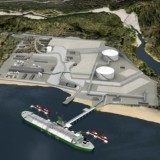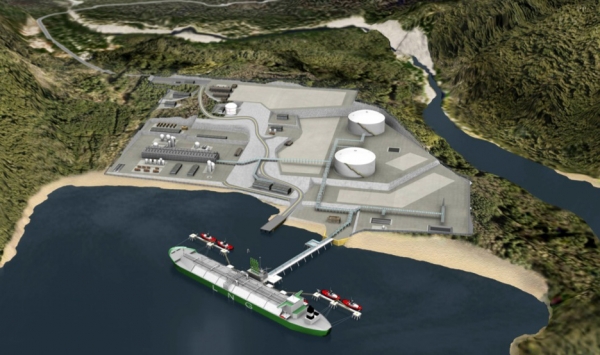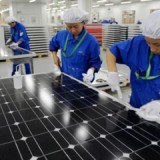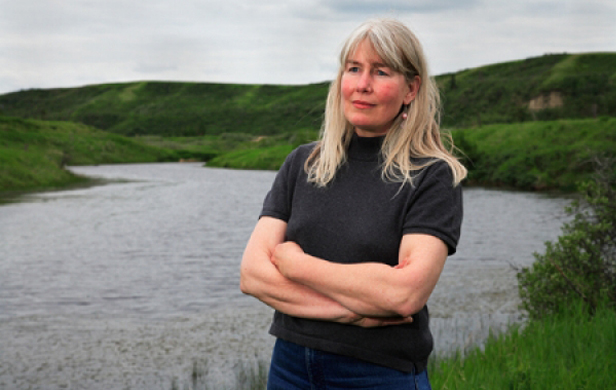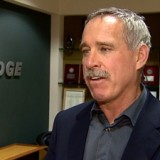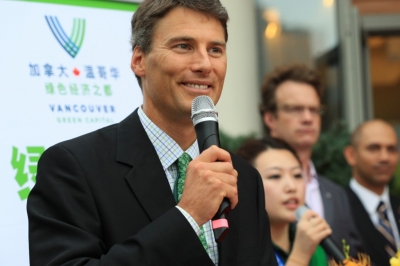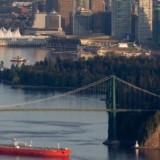Despite over 9,500 public submissions to the Joint Review Panel for the proposed Enbridge Northern Gateway Pipeline – with a resounding96% opposed – John Carruthers, the company president in charge of the project, remains confident it will proceed.
Carruthers told reporters outside the final round of hearings in Terrace, BC this week, “I think the chances of it going ahead are very probable.”
Either this is desperate, last-ditch posturing – in which case Mr. Carruthers is misleading his shareholders – or, giving him the benefit of the doubt, he believes what he says.
Consider the implications for a moment, given the wholesale rejection of the project from every quarter.
Enbridge has been told, “NO”, six ways from Sunday over the past five years.
An unprecedented, unified “No” from First Nations all along the pipeline and tanker routes – backed by others all around the province and beyond. Over 160 altogether. Their resolve has not wavered – even when Enbridge tried to engineer the splintering of this phalanx through atrumped up, discredited deal with a rogue Gitxsan treaty negotiator, the ham-fisted maneuver backfired badly. The “unbroken wall” of opposition promised by chiefs like Jackie Thomas of the Saik’uz Fisrt Nation has held all this time.
Northern municipalities – Prince Rupert, Terrace, Smithers – have passed resolutions telling Enbridge, “No.”
Ecologists, biologists, statisticians, fishermen, marine safety and oil spill recovery experts, even respected economists have lined up to tell Enbridge, “No.”
The province’s Official Opposition and Government have both, essentially, told Enbridge, “No.”
In fact, the only person who has said “Yes” to Mr. Carruthers is Stephen Harper – and even his support is wavering these days. His top BC minister, James Moore, responded to the Clark Government’s closing statement against the pipeline at the JRP hearings, noting, “there are many pathways for Canadian resources to get out of the country, and we’ll see if Enbridge looks at other opportunities.” According to CBC, “He said his government supports B.C.’s five conditions for heavy oil pipelines…Moore says his government supports getting natural resources out of Canada, whether through Northern Gateway, or other projects, but any company must be accountable to the people living where it wants to build.”
Harper is changing his tune because even he can see what everyone else but Carruthers can: this project is dead in the water.
Mr. Carruthers’ confidence is based on his own subjective certainty that Northern Gateway is “a tremendously needed project for Canadians to get full value for their resources which are critically needed and that need is even more urgent than it’s been.”
This baseless fear-mongering was echoed by Enbridge lawyer Richard Neufeld, who also took the stand Monday to extoll his company’s project. If Enbridge were denied, “Canada would be facing, we submit, an economic catastrophe of unprecedented proportions,” Neufeld told the Joint Review Panel.
This laughable, self-serving rhetoric flies in the face of the independent economic analysis of former ICBC CEO Robyn Allan and many others who have warned of the economic perils to Canadians from exporting unrefined bitumen to foreign markets. Even the venerable Organization for Economic Cooperation and Development (OECD) acknowledges that building a petro-economy leads to net economic losses as manufacturing and other sectors are squeezed by artificially inflated currencies.
It is by no means a given that opening up BC’s coast to raw fossil fuel exports will do anything but imperil our “Super, Natural” brand and the $13.4 Billion tourism economy upon which it depends.
Mr. Carruthers is confusing what’s in the economic interest of Canadians with that of himself and the foreign-owned oil producers who would use his infrastructure to export Canadian jobs and resource wealth to foreign markets. They are not remotely one and the same. When we hear “the economy”, we must always ask, “whose economy?”
And what of the inordinate human, environmental and, yes, economic costs of the climate catastrophe this project would help facilitate? Even the US Government is coming to terms with the socioeconomic costs of carbon. Applying their own calculations to the proposed Keystone XL Pipeline yields a prediction of up to half a trillion dollars in carbon-driven social costs.
There is no glut of supply in North America’s pipelines, no “bitumen bubble” driving down Tar Sands prices. Canada is a net importer of oil, for Pete’s sake. American buyers pay less for Canadian dilbit and syncrude because they are inferior products to light crude, thus meriting a discounted price.
That will always be the case, whether the customer is China or America. International crude prices may be higher for now, but dilbit will always be discounted – and the minimal additional profits from international markets are sure to wind up in the largely foreign pockets of shareholders, not trickling down the Canadian public, as we are to believe.
Contrary to Carruthers and Neufeld’s Chicken Little prognostications, the sky will not fall on Canada’s economy should Enbridge face rejection. And what does their opinion count for on this score anyway? They are the project proponent – not independent economists.
That’s what makes this all so insulting – the righteous indignation, the holier-than-thou pontificating, the outrageous scare tactics, the thumbing of noses by these gentlemen from Calgary at BC’s First Nations and citizens.
If Mr. Carruthers is delusional, as I suspect, then that’s his problem I suppose (and that of his shareholders).
If, on the other hand, he’s right and his much-maligned project does go ahead, then what does that say about this country in which we live? When 96% of the engaged citizenry and assorted experts who take the time to prepare and submit their thoughts to a two-year National Energy Board hearing speak against the project; when First Nations who hold unceded, constitutionally protected title and rights to these lands and waters remain unequivocally opposed…and it goes ahead, what does that say about Canada?
If that happens, we can all just quit referring to this country as a democracy. Full stop.
But I don’t think that’s what’s going to happen at this stage. I think Mr. Carruthers is full of it.
What has me more concerned these days is the following scenario: Enbridge gets rejected. Instead, we see three or four “gas pipelines” built to BC’s coast – sailing past regulatory hurdles while the public and media are distracted by Enbridge. The “gas pipelines” are ostensibly to feedboondoggle LNG projects in Kitmat and Prince Rupert – which never materialize because the economic fundamentals simply aren’t there (more on that next column). Said “gas pipelines” get converted to dilbit pipelines, LNG terminals swapped for dilbit terminals. And, presto! It won’t be called Enbridge, but – except for Mr. Carruthers – who cares? Same impact on our economy and environment.




